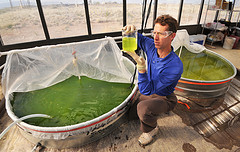 When we think of biofuels we typically think of food crops and feed stocks which are first generation biofuels. Second generation biofuels employ advanced technologies that can lower the land footprint associated with production and improve the energy balance of the biofuel. Algae-based fuels are an example of such second generation biofuels that are currently being investigated for its potential commercial value. Under the right conditions, large amounts of algae grow naturally. Half of algae's composition is lipid oil, and it is the extraction of this oil that scientists seek to convert into a more clean and efficient fuel.
When we think of biofuels we typically think of food crops and feed stocks which are first generation biofuels. Second generation biofuels employ advanced technologies that can lower the land footprint associated with production and improve the energy balance of the biofuel. Algae-based fuels are an example of such second generation biofuels that are currently being investigated for its potential commercial value. Under the right conditions, large amounts of algae grow naturally. Half of algae's composition is lipid oil, and it is the extraction of this oil that scientists seek to convert into a more clean and efficient fuel.
It is possible that algae can be manipulated to be produced in large quantities, by photosynthesis with water, sunlight and carbon dioxide, without disturbing any natural habitats or compete with food crops for land and the recycling of carbon dioxide reduces pollution. When the oils have been extracted, methane can be pulled after the waste goes through a digester and the resultant enriched mineralised sludge can be used to fertilise land crops, as feedstock or reused to grow more algae. Furthermore, micro-algae are the most effective organism at scavenging dilute Phosphorus from water making them capable of cleaning fertiliser contaminated water and waste water, thus can be combined when dealing with issues of eutrophication.
With a seemingly promising future, why aren't algae-based biofuels at the forefront on the renewable energy revolution? Viable production is dependent on the type of algae used, the way in which it is grown and the method of oil extraction and so far is considerably expensive in while oil is still sufficiently low-cost. Currently, around 20,000 tonnes of fuel can be produced a year, but demand requires amounts in the millions. Therefore start-ups require the most cost-effective method. Some use algae ponds, clear plastic containers, grown in sunlight or are feed sugars, some use conventional breeding and others use genetic engineering. There are simply too many unknowns in this area of research because there is no history of breeding and so there are many experiments without conclusive evidence for feasible commercialisation. What will likely be commercialised first is the oils that can be produced for higher valued goods.
Long term efforts for the production and integration of algae-based biofuels have progressed slowly as they are thought to compete with fossil fuels in cost but there is also a limited understanding for the best way to proceed for large-scale cultivation. Questions also arise asking how realistic is algae biofuel supply in proportion to projected population growth and consumption demands. This does not mean that efforts should be slowed as an oil field with eventually deplete while an algae pond would be sustainable indefinitely so the real game changer could be when fuel prices become too high. In the end production will depend on the economics of its commercialisation potential when either or both the biology and technology become workable.
photo credit: <a href="http://www.flickr.com/photos/sandialabs/4150749229/">SandiaLabs</a> via <a href="http://photopin.com">photopin</a> <a href="http://creativecommons.org/licenses/by-nc-sa/2.0/">cc</a>
No comments:
Post a Comment